- Home
- Johnny D. Boggs
A Thousand Texas Longhorns Page 4
A Thousand Texas Longhorns Read online
Page 4
CHAPTER SIX
Molly McDonald was in her cups, but she wasn’t drunk enough to ignore the woman’s scream down by the privies—even if her comrades were.
“What you stop for, Mickey?” the Bulgarian said, nodding toward the wagon yard.
“You hear that?” Molly asked.
“Yeah, Mickey, we heard it,” said Harvey Coleman. “I sound like that when I take a shit after eatin’ at Michener’s. C’mon, we’re three sheets to the wind and gotta pull out of this pigsty before daybreak.”
“You bitch!” came a curse in the blackness behind the privies, followed by a thud against wood.
“Ain’t no concern of ourn,” Coleman argued.
“You boys go on,” Molly told them. “I gotta take a piss.”
“Mickey,” the Bulgarian said. “Not your affair.”
“Get to the wagons,” Molly ordered. “I’m just taking a piss. Give you my word of honor.”
Reaching behind her back, she withdrew the bung starter. Never had been much of a hand with revolvers. Knives, either, but give her a blacksnake whip, and she could guide a freight wagon across the North Platte and to the banks of the wide Missouri without working up a decent sweat. Twenty yards into the darkness, she stopped, turned, and glanced at the street. Coleman and the Bulgarian, true to their word, were out of sight. Now Molly felt her heart slamming against her rib cage, and the wooden handle of the weapon she’d stolen from a Leavenworth saloon felt clammy in her hands.
Three years she had been doing this, living in a man’s world like a man. Chewing tobacco, drinking the worst liquor in the territories, having to sneak away to empty her bladder, but her parents hadn’t found her, and unless she slipped, probably never would. Hell, they’d likely given up on ever seeing their beautiful Southern belle again. Besides, if they saw what she had become, they’d disown her—much as she had disowned them three years ago.
Her blond hair had been shorn tightly, linen kept her breasts tight beneath her coarse muslin shirt, the wind and sun had bronzed her face, and she had learned not to take a bath very often. She wore a black patch over her left eye, but had the Bulgarian or Coleman ever borrowed it, they would see right through it.
Somewhere beyond the adobe village and Fort Kearny, a coyote yipped. Molly stepped to the first privy, thankful that the Nebraska cold kept the stench down in the two-holer. Well after midnight, with just a sliver of a moon, the alley in Dobytown remained dark.
Another noise reached her ears, and she wondered why the hell she had decided to be so brave. She certainly didn’t need to impress the Bulgarian or Coleman. A figure lurched around the edge of the picket structure, and Molly choked back a shriek before she swung the bung starter up. She had to swing up. Molly didn’t stand much taller than five feet in her short-heeled boots, and the man coming at her had to be five foot eight.
Her blow landed solid. The man let out a yelp, fell hard to the ground, and did not move.
Knees buckling, Molly sank beside the son of a bitch she had just laid out cold. The rye almost made its way up her throat, but she choked most of it back into her gut, turned, spit the rest onto frozen sod.
When her chest stopped heaving, she managed to say, “Shit.”
The man groaned. Molly brought up the bung starter and quickly dropped it. “Shit,” she said again, and rammed her left hand into her coat pocket, brought out the lucifers, and struck one against her thumbnail. Wind blew out the flame, so she cursed again, fingered another lucifer, and this time cupped her hands as soon as the tip flared to life. On her knees, Molly moved closer to the man.
“Son of a bitch,” she said. “You’re a woman.”
Men didn’t wear dresses. Molly laughed at the thought. And women don’t wear trousers or chew tobacco. She started to bring the match closer to the woman’s face, saw the knot and blood the bung starter had left on her forehead, and then glimpsed something else, closer to the privy, reflecting the match’s flame. Walking on her knees, she moved toward the other body on the ground and brought up the match just as it blew out. Another curse, another match, and the fire cast an eerie glow on . . .
She whispered a series of profanities toward the corpse.
Molly McDonald might have clubbed a woman by mistake, but there was no doubt that the man with the butcher’s knife stuck just below his rib cage, angling upward, buried all the way to the hilt, was none other than Brevet Major Warner Balsam. Deader than President Lincoln himself.
Swearing again, she shook out the match, pushed herself into a standing position, and said, “Wait here, lady.” Then she took off down the alley, back to what passed for Dobytown’s main drag, for she remembered the mule tethered in front of the crib next to the Bona Fides. The jack was still there, didn’t even resist when Molly loosened the reins and led the lethargic but otherwise cooperative animal a tenth of a mile to the alley, then down toward the privies. That’s when the mule started braying.
Must’ve smelled the blood, Molly figured, since an animal’s sense of smell was stronger than her own, especially after all that rye she had consumed at the Jack of Diamonds.
“Stay,” Molly told the mule, as if ordering a dog.
She dropped beside the woman, still breathing, now groaning. She saw her ripped blouse, the two fingernail scratches along her neck. Easy to figure out what had happened, for Molly had seen the major at work before. Some poor wayfaring lass on the Overland Trail. Maybe a widow, though Molly saw no ring. Maybe . . . anything. That cretin Balsam deserved what he had reaped. But Molly also understood the temperament of a place like Dobytown and of soldiers stationed at Fort Kearny. Hanging a murderess sure would break up the monotony of a Nebraska winter.
Molly moved to the corpse and reached toward his blouse. Months had passed since she had touched a dead man, and that had been some poor wayfarer who got filled with arrows and scalped by Cheyennes. At least, that’s how Coleman figured it, and Coleman had been moving up and down this trail since the Oregon rush. She tried to avoid the dead man’s eyes. Yeah, he had to be dead. Eyes hadn’t moved one way or tother since she had first spotted him. Her fingers touched the cold chain of a watch, and she ripped it up, watch and all, though the fob broke off and fell somewhere. It didn’t matter. Bringing the watch, still ticking, toward her face, she could feel its weight. Maybe gold. It was hard to tell in the darkness, but it kept right on ticking. So she swung it hard against the privy door. The noise stopped. She filled her lungs, held her breath, entered the outhouse, found the opening, and dropped the busted watch into the stinking depths.
Next she found his billfold, from which she withdrew the government scrip. These she stuffed inside her left boot top. The Remington revolver and pouch of leaden balls and percussion caps she deposited into another privy.
All right. Molly could breathe now. But what about the knife? Would a thief and murderer leave a knife in the murdered victim’s body? Probably not. She sat beside the dead man, gripped the freezing handle, and tugged.
“Son of a bitch,” she said. Damn thing didn’t budge. She started again, but out of the corner of her eye, saw the mule begin to wander back toward Dobytown’s main drag.
“Hold on.” She sprinted forward, grabbed the reins, and tied one to the unconscious woman’s ankle. Now she had to catch her breath, but not for long, because voices sounded. Maybe from the Jack of Diamonds, but possibly closer. Men who drank eventually urinate. So do women. With everything going on now, Molly thought she might piss her britches.
Another curse, and she left the blade buried inside the major and moved toward the woman.
She lifted. A woman just over the five-foot mark usually wouldn’t be able to jerk the dead weight of a woman six or seven inches taller up, but Molly “Mickey” McDonald had put on some muscle all these years.
The woman’s head titled, and she puked all over Molly’s coat.
She called the woman an unpleasant name.
“C’mon,” Molly said. “They catch you here, both of u
s’ll be swinging in the breeze.” She tugged. At length, Molly managed to drop the upper half of the tall blonde’s body over her shoulder. Even managed to stand and stagger toward the borrowed mule. She never quite figured out how she got the woman draped over the packsaddle, didn’t figure it would be comfortable, but that bung starter had likely sent this pretty little thing to another world for the rest of this evening.
Now all Molly had to do was get the lady and the mule as far away from the privies as she could. Get her to the wagon yard, convince the Bulgarian and Coleman that this was the right thing to do, the only thing to do, the Christian thing to do. Maybe she could tell the Bulgarian that the man this damsel had stabbed to death was a Turk. The Bulgarian, for some reason or the other, didn’t care too much for Turks.
Turn the mule loose, get some shut-eye, see what happened outside Fort Kearny on the morrow.
She tugged the reins. The mule brayed.
* * *
“Your mind’s gone,” Coleman told her.
“No,” Molly countered. “I—”
The Bulgarian interrupted. “She roll Major. Kill him. Kill him dead. That what they say in Dobytown.”
Coleman added. “It’s what they say at Fort Kearny, too.”
Molly found the coffee, refilled her tin cup, then spit tobacco juice onto the coals. “That ain’t what happened.”
“It’s what Cap’n Jessup says happened,” Coleman said. “How do you know the major was trying to take advantage of this woman?”
Because . . . Molly didn’t have a chance to make up a good lie for the Bulgarian, who added, “She not even wake up. You hit her?”
“Yeah, I hit her. Scared the tar out of me.”
“I told you not to go down that alley,” Coleman reminded her.
“Look here,” Molly said. “There’s scratches on the woman’s neck. Her blouse is ripped.”
“Could be from the major defending himself,” the Bulgarian said.
“We’ve made this haul too many times to count,” she reminded her pards. “You know how Balsam worked. Remember that whore from eight months back?”
“Sergeant O’Brien said the major’s watch was gone. And his revolver.”
“So it would look like the sumbitch was robbed and killed. So they’d be looking for a man. Not a woman.”
“A man,” the Bulgarian said. “Like us.”
“He had a poke on him, too,” Coleman said. “Poke.” He grinned. “Poke like a sack of money or gold dust. Not poke like . . .” The smile broadened. It might have been the best pun, or joke, or whatever the hell it was, Coleman had come up with in thirteen years west of the Missouri.
Molly’s eyes rolled. “Those army boys aren’t gonna be going after us. Not back to Leavenworth. And you leave it to me, and I’ll have this petticoat looking worser than me. She’ll pass for a man, sure as I’m sitting here.”
“I don’t know,” the Bulgarian said.
“You want to let a bunch of vigilantes lynch a pretty girl? Well, I thought I rode with men. You want to turn her over, go ahead. I’ve made my play. But you’ve been riding for this outfit a trifle longer than me. It’s your call, men.”
The Bulgarian studied Coleman, who turned toward Molly. “What about the major’s poke?”
Molly slipped her fingers inside the boot top, drew out the scrip, and waved it in front of her partners’ eyes.
“We split even?” the Bulgarian inquired.
“Just like always,” Molly said.
Coleman’s head bobbed as he reached for the paper currency. Molly let him take it, but snatched a couple of bills from his fingers and held them up. “This is for the lady. She’ll need some new duds. Men’s clothing.”
“What about her hair?” Coleman stared at the woman, still unconsciousness.
“While I’m at the sutler’s, you cut it off. Short.”
The Bulgarian sighed. “A shame. Pretty golden locks.”
“Ain’t it, though.” After stuffing the scrip in her trousers pocket, Molly started for Dobytown.
CHAPTER SEVEN
“Looky here, youngster.” The bearded man withdrew the meerschaum pipe, blew smoke toward the loft, and pointed the stem toward the stalls on the right. “What do you see there?” The wooden stem turned to the left. “Or there?” He stepped out of the barn and nodded in the general direction of the community of Summit, then gestured toward the cemetery, old mining claims, and the hills overlooking Virginia City. “Or anywhere?”
Mason Boone blinked. All he had done was ask the man if he had any work needed done. Boone wasn’t quite sure when he had last eaten, and homemade liquor couldn’t keep a body going forever.
“You know what I see?” the old man began.
Boone realized he had picked the wrong place to ask for a job.
“I see a big city that’s missin’ one thing: People.”
He hacked, spit, and tapped the pipe’s plain bowl on a hitching rail. “Ain’t just here, boy, it’s all up and down the Fourteen Mile City. Ever’ camp from Alder to here and gone’s seein’ the same dad-blasted thing. Gold gets found up in Last Chance Gulch. Same ol’ story, son. They find pay dirt on Grasshopper City, and Bannack City sprouts up overnight. But then when we find a bonanza here, in Alder Gulch . . . You been to Bannack lately? Know what you’d find if you done so? I’ll tell you, boy. You’d find a big city without a whole lot of people. And now . . . we got folks lightin’ a shuck up north to Last Chance Gulch. And that ain’t a fittin’ name for a minin’ camp, boy. Last Chance? There’ll be hundreds of other chances. Gold’s everywhere. Hell, boy, folks here ain’t just pullin’ out up that way. Some are gallopin’ over yonder way, to Emigrant Gulch by the Yellowstone. I’ve half a mind to flip a three-cent nickel, and if she turned up with the lady’s head, I’d move northeast to Emigrant Gulch, and if she showed the three columns, I’d mosey up that way, to the Last Chance. And if she landed on her side, straight up, I’d move back to Bannack. Or Idaho. Or the Pikes Peak country. And if I had one iota of brains in my noggin, I’d just say to hell with it all and go back home to Springfield, Missouri. Most days, I wish I’d never left anyhow.”
He sucked on the pipe, realized it was out, and shoved it into a pocket in his mackinaw.
The old man stared again at Boone, sighed, and asked, “Where you from, boy?”
“Texas.”
“You traveled all that way . . . for this?”
Farther, Boone figured. He had deserted the 10th after Kennesaw Mountain. Still, he let his head bob a couple of times.
“Well.” The big boots shuffled. “You asked to work. That says somethin’ ’bout you. Most of the bummers just beg for enough to get a dram of beer. Man with a charitable streak could go broke. We ain’t got a bad town. Not yet. Still the territorial capital, though I reckon we’ll see how long that lasts. I’ve seen better-lookin’ gents, though you might clean up if you’d shave and . . . Jesus . . . taken a bath. Wind must’ve just shifted directions. You stink worser than goat piss.” He spit again, looked Boone up and down, and, at length, sighed. “I tell you what, buster, I ain’t forgotten St. Vincent de Paul. Ain’t much to muck, but you clean out the stalls, feed and grain the three horses I got here—but not the bay. Bay gets hay only. She don’t take to grain. Probably a Kootenai pony, I don’t know. Water ’em all. You do that, and I’ll pay you two dollars.”
Two dollars. Boone could hardly believe it. Two whole dollars for half a day’s work. Then he recalled where he was and how much two dollars would buy a man in an expensive place like Virginia City. That might buy him as much as a three-cent nickel would back home in Tyler.
The man kept talking.
“You can sleep in the stall. No, no. Best not sleep in a stall. Stinkin’ the way you do, you’d drive off any business that might come my way. Sleep in the loft. Back of the loft. It’s warm enough up there. I’ll see if I can’t find an extra saddle blanket you can use. That suit you?”
Boone nodded.
�
�You get paid in the morn.” The old man stiffened. “After I’ve graded your work. You do a pissant’s job, you get a kick in the pants.”
Boone remembered the first mine boss he worked for. And the second. All this codger had to say come morning was that the work wasn’t up to his standards, now scat. But, hell, it was cold outside, and at least Boone had a place to sleep for the night. Mucking stables, feeding horses, that would at least take his mind off the emptiness in his belly.
“All right.” Boone held out his hand.
The man stared at it, started to shake, but suddenly stepped back, raising his hand, grabbing the brim of his slouch hat, and whipping it off his head.
“Missus Story,” he said past Boone’s shoulder. “It’s mighty nice to see you, ma’am.”
Mason Boone instantly detected the aroma of pies.
Turning around, he reached to remove the hat he had lost, realized his mistake, and took a step back, suddenly aware of just how ripe he was. Maybe . . . maybe he could take a bath in the livery. Without freezing to death.
“I have been looking for you,” she said. He saw the pies on the tray.
“Take one,” she told him, smiling.
She wore a dress of cornflower blue crinoline, striped with thin black lines. Beige hat. Dainty gloves. A black scarf tight around her throat, and a shawl of dark blue wool. He hadn’t seen a dress like that since . . . since, well, he and some of the boys had purloined a copy of Godey’s Lady’s Book and Magazine back before Pumpkin Vine Creek, to admire the women pictured, not the latest fashions.
“Please,” the woman said, and smiled. “A gift. An apology. Please.”
His stomach grumbled audibly, and his face flushed with embarrassment.
“It’s not a handout, sir,” she said. “It’s payment for . . .” Her head tilted toward his, which began to throb again.
“If you like, consider it a grubstake,” she said.
Boone looked, swallowed, could not figure out what to do.

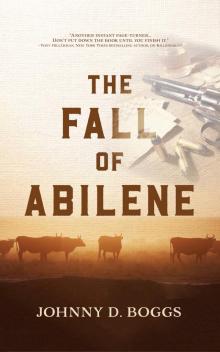 The Fall of Abilene
The Fall of Abilene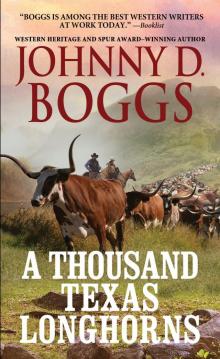 A Thousand Texas Longhorns
A Thousand Texas Longhorns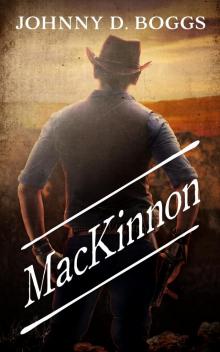 MacKinnon
MacKinnon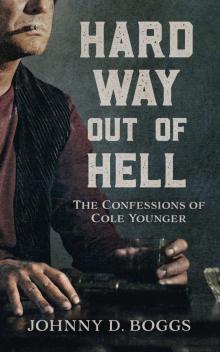 Hard Way Out of Hell
Hard Way Out of Hell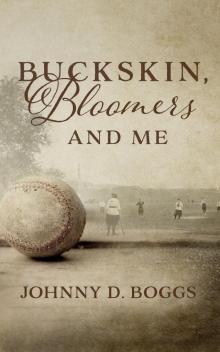 Buckskin, Bloomers, and Me
Buckskin, Bloomers, and Me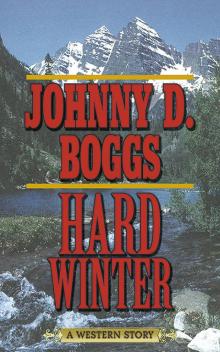 Hard Winter
Hard Winter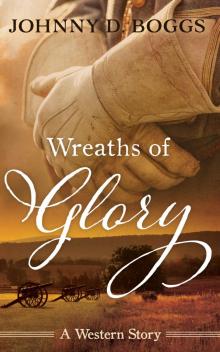 Wreaths of Glory
Wreaths of Glory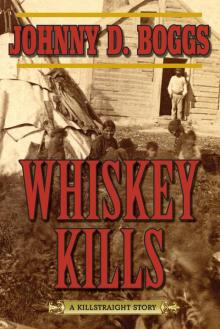 Whiskey Kills
Whiskey Kills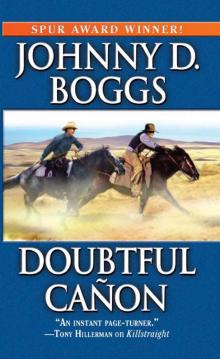 Doubtful Canon
Doubtful Canon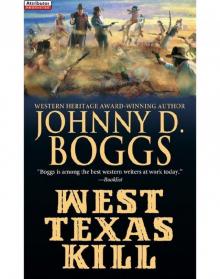 West Texas Kill
West Texas Kill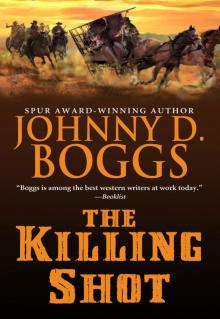 The Killing Shot
The Killing Shot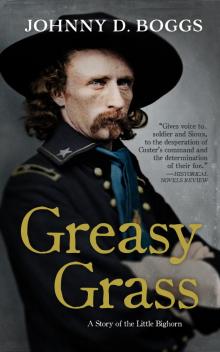 Greasy Grass
Greasy Grass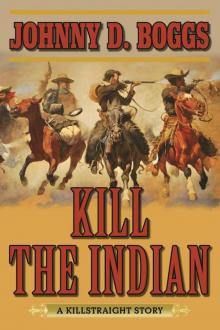 Kill the Indian
Kill the Indian Return to Red River
Return to Red River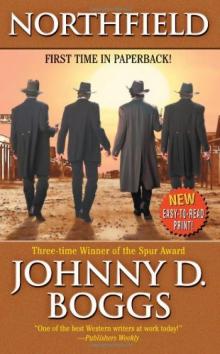 Northfield
Northfield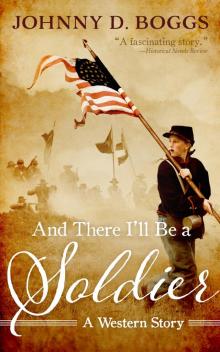 And There I’ll Be a Soldier
And There I’ll Be a Soldier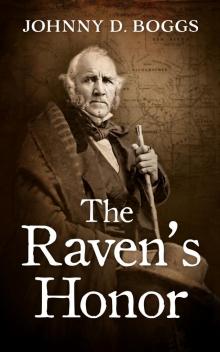 The Raven's Honor
The Raven's Honor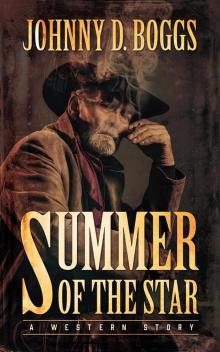 Summer of the Star
Summer of the Star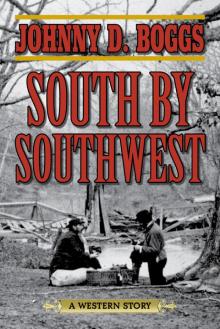 South by Southwest
South by Southwest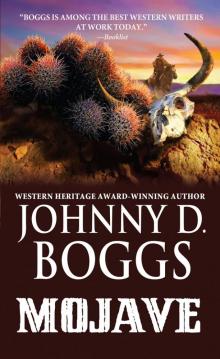 Mojave
Mojave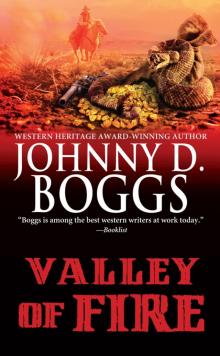 Valley of Fire
Valley of Fire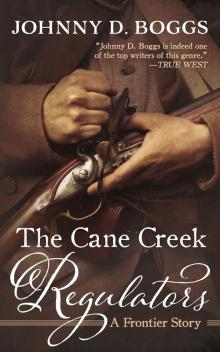 The Cane Creek Regulators
The Cane Creek Regulators